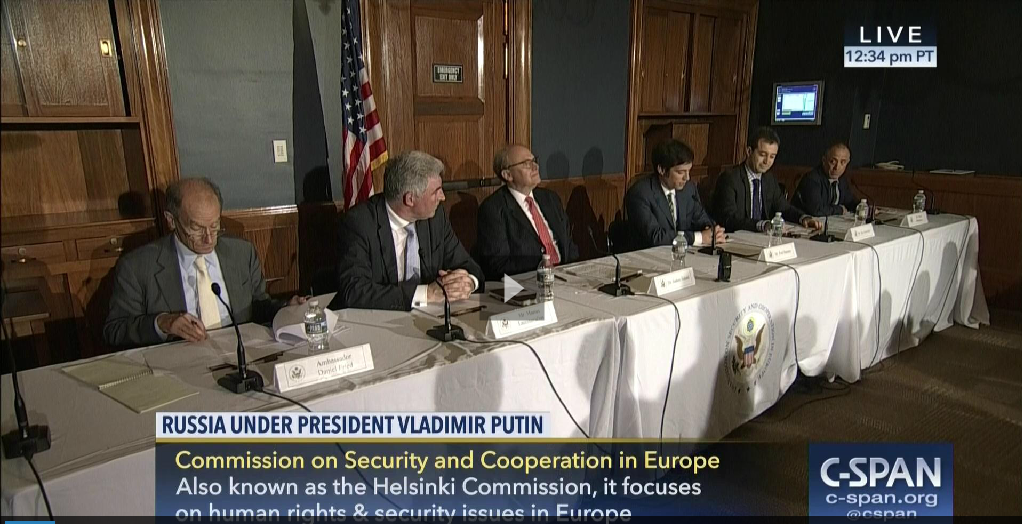On July 20, 2017, the U.S. Commission on Security and Cooperation in Europe held a staff-led briefing on Russian kleptocracy. Panelists included Brian Whitmore, Author of the Power Vertical Blog and Senior Russia Analyst at Radio Free Europe; Ilya Zaslavskiy, Research Expert at the Free Russia Foundation and Academy Associate with Chatham House; Dr. Anders Aslund, Senior Fellow at the Atlantic Council and Professor at Georgetown University; Marius Laurinavicius, Senior Analyst at the Vilnius Institute for Policy Analysis and a former Fellow with the Hudson Institute; and Ambassador Daniel Fried, Distinguished Fellow at the Atlantic Council and former Coordinator on Sanctions Policy at the US Department of State. The discussion, which was covered by C-SPAN 1, was moderated by Paul Massaro, Helsinki Commission Policy Advisor on Economic and Environmental Issues.
Whitmore provided an insightful overview, explaining how kleptocracy ensures the control of loyal elites while simultaneously providing the Kremlin with a tool of statecraft internationally. In a compelling argument, he compared corruption with communism, as the Kremlin’s use of kleptocracy is reminiscent of the use of communism as a tool for international influence during Soviet times.
Zaslavskiy spoke about how the current regime took the worst but most practical lessons from the Communist party, the KGB, and organized crime, and amalgamated these practices into the corrupt system that exists today. Therefore, he rejected the term “oligarch,” deeming it irrelevant. This notion would assume that businesses act independently, when in reality, their operations depend on the Kremlin’s approval.
Dr. Aslund, in agreement with Zaslavskiy, concluded that oligarchy is over, as it has been assimilated by the state. He broke down the Kremlin’s system of kleptocracy into four different aspects: firstly, the state institutions, the security agencies, and the judiciary; secondly, the state corporations; thirdly, President Putin’s circle of loyal cronies who benefit from asset stripping and procurement contracts from the state; and lastly, the West. Western complicity is an essential aspect of Russian kleptocracy, as cronies take advantage of rule of law in the West to secure assets from the East. Dr. Aslund called for tougher measures to ensure transparency and beneficial ownership.
Laurinavicius then joined in to provide a Baltic perspective, arguing that lessons can be learned from the three Baltic States, the front line in the fight against Russian kleptocracy. Laurinavicius argued that Putin’s regime uses kleptocratic cronies to achieve goals that the state cannot achieve itself. He emphasized how the Baltic region has been a target of these kleptocratic tactics as early as 1991 in the immediate aftermath of the dissolution of the Soviet Union.
Lastly, Ambassador Fried expanded on tools to combat kleptocracy. He cited journalistic exposure and governmental pressure as two critical aspects of a comprehensive strategy. Naming the Global Magnitsky Act as a legislative vehicle that allows lawmakers to go after Russian human rights abusers, Ambassador Fried called for additional legislation to target individuals complicit in Kremlin’s system of kleptocracy.
Ambassador Fried ended the panelists’ testimonies on a hopeful note:
“I do not believe that Russia is doomed to live forever its worst history. I don’t accept the notion of a civilizational divide. In Russian history, Russia does, when it fails at external aggression, turn to internal reform, and has sometimes been successful. And the period of Russian history we think of as the most successful, the period that gave us world-class literature and art and music, and a rapidly developing economy, and the beginning of a more modern economic system, came as a result of its – the failure of its aggression and failure in various wars – Crimean War, Russo-Japanese War. I mention this because it is important to remember what it is we are trying to achieve. We are not trying to achieve a weakening of Russia. We are trying to achieve a defeat of Putinist Russia, the better to have a better relationship with that better Russia.”




